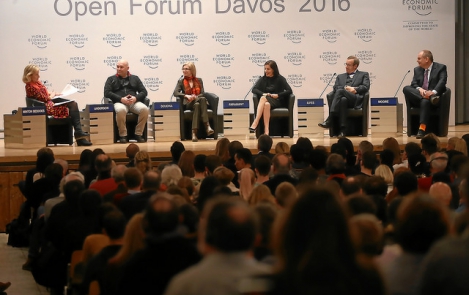-
Reset
+


President Ilves: the European Union must not become a museum for fast digital countries
Saturday, 23 January 2016 11:46
President Toomas Hendrik Ilves, at the discussions concerning the availability of the Internet and technologies of the Future at the World Economic Forum in Davos, encouraged the European Union and all its member states to smartly contribute to the digital future with diligence and commitment, and he also expressed his concern with the digital backwardness of the European Union.
"Should the European Union fail to keep pace with digital development, we will soon become a beautiful museum for the United States of America, India and China, who will pull ahead, fast," warned President Ilves at a discussion that was facilitated by Houlin Zhao, Secretary-General of the UN International Telecommunications Union, ITU.
The Estonian Head of State also presented the recently published World Bank's 'World Development Report 2016: Digital Dividends', which was prepared under the joint leadership of the President. The extensive development report includes Estonia as a successful example of the use of various technical solutions to support economic development and the progress of society.
President Ilves admitted that the World Bank's report draws a conclusion similar to the experiences of Estonia: that a reliable legal system and public sector together with legislation that supports entrepreneurship and innovation represent an inevitable pre-requisite for benefiting from digital development.
One of the conclusions highlighted by the report is the fact that easy access to information is the key to the economic development of countries, relayed the Estonian Head of State: "Just as the printing machine of Gutenberg predicted the dawn of a new information era, Tim Berners-Lee could be described as a modern-day Gutenberg because the web that he invented can be seen as the beginning of a new information era in both developing and developed countries."
To make the most of the opportunities offered by the digital era, people must develop new and modern skills for the use of technology; we can't expect the development of a digital economy without skilful and smart users, emphasised President Ilves.
"Therefore, everything should start from school, and new interpretation and re-shaping of the future should be seen as key at this stage. We must make real sciences interesting for young people at the basic school stage and ensure they are not fearful of mathematics or of making mistakes. It's too late to do it when they reach university level," he said.
President Ilves also took part in a public discussion with influential academicians and entrepreneurs on examining the possible effects of future technologies on our lives in about 15 years' time. For example, the discussion touched upon the mining on asteroids, genetically modified children, self-driving vehicles and related ethical dilemmas. The participants admitted that new technologies are always a bit inconvenient and uncomfortable; however, historical experiences show that you can't stop the development of technology and mankind has mostly gained from each technological revolution.
The exciting public discussion is available to view at the following link: http://www.openforumdavos.ch/en/life-in-2030-humankind-and-the-machine.html
Office of the President
Public Relations Department




